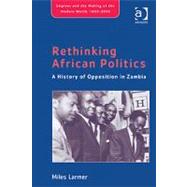Rethinking African Politics: A History of Opposition in Zambia
, by Larmer,Miles- ISBN: 9781409406273 | 140940627X
- Cover: Hardcover
- Copyright: 9/28/2011
In 1964 Kenneth Kaunda and his United National Independence Party (UNIP) established the nation of Zambia in the former British colony of Northern Rhodesia. In parallel with many other newly independent countries in Africa this process of decolonisation created a wave of optimism regarding humanity's capacity to overcome oppression. Yet, as this study shows, in Zambia as in many other countries, the legacy of colonialism created obstacles that proved difficult to overcome. Within a short space of time democratisation and development was followed by economic stagnation, political authoritarianism, corruption and ethnic conflict.To better understand this process, Dr Larmer explores UNIP's political ideology and the strategies it employed to retain a grip on government. He shows that despite the party's claim that it was adhered to an authentically African model of consensual and communitarian decision-making, it was never a truly nationally representative body. Whereas in long-established western societies unevenness in support was accepted as a legitimate basis for political difference, in Zambia it was regarded as a threat to the fragile bindings of the young nation state, and as such had to be denied and repressed.Through case studies of opposition political and social movements rooted in these differences, the book demonstrates that UNIP's grip on the new nation-state was partial, uneven and consistently prone to challenge. Alongside this, the study also re-examines Zambia's role in the regional liberation struggles, providing valuable new evidence of the country's complex relationship with Apartheid-era South Africa and the relationship between internal and external opposition, shaped by the context of regional liberation movements and the Cold War. Drawing on extensive archival research and interviews, Dr Larmer offers a ground-breaking analysis of post-colonial political history which helps explain the challenges facing contemporary African polities.







